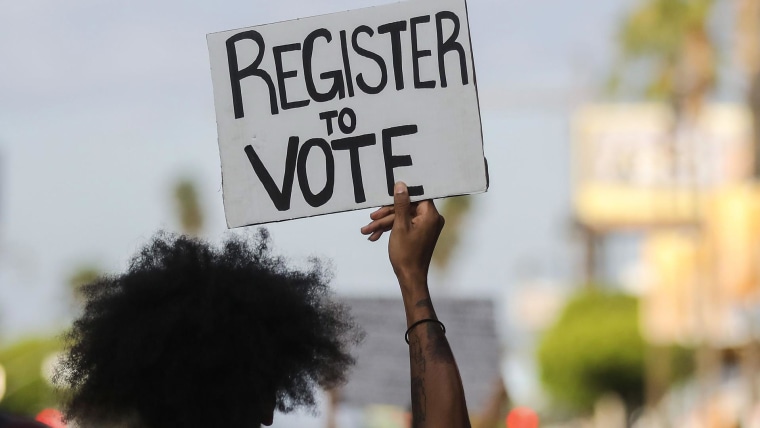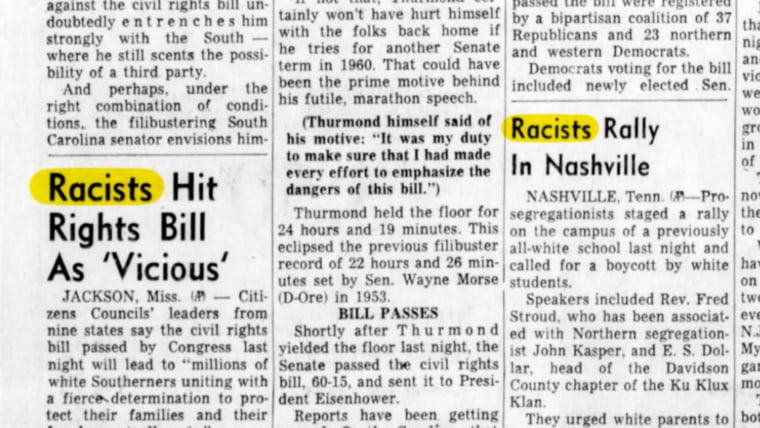Among Evangelical Christians What Percentage Read the Bible Daily
Over the last several weeks, the Usa has engaged in a long-overdue reckoning with the racist symbols of the past, violent downward monuments to figures complicit in slavery and removing Amalgamated flags from public displays. But little scrutiny has been given to the cultural institutions that legitimized the worldview behind these symbols: white Christian churches.
In public opinion polls, a clear pattern has emerged: White Christians are consistently more than likely than whites who are religiously unaffiliated to deny the being of structural racism.
A shut read of history reveals that we white Christians take not just been complacent or complicit; rather, as the nation's dominant cultural power, we have synthetic and sustained a project of perpetuating white supremacy that has framed the entire American story. The legacy of this unholy union notwithstanding lives in the DNA of white Christianity today — and not just among white evangelical Protestants in the South, but as well among white mainline Protestants in the Midwest and white Catholics in the Northeast.
For more two decades, I've studied the attitudes of religiously affiliated Americans beyond the country. And year over twelvemonth, in question after question in public opinion polls, a clear pattern has emerged: White Christians are consistently more likely than whites who are religiously unaffiliated to deny the existence of structural racism.
For example, surveys conducted by PRRI in 2018 found that white Christians — including evangelical Protestants, mainline Protestants and Catholics — are nearly twice as likely as religiously unaffiliated whites to say the killings of Black men by police are isolated incidents rather than role of a blueprint of how police care for African Americans.
And white Christians are about 30 percentage points more likely to say monuments to Confederate soldiers are symbols of Southern pride rather than symbols of racism. White Christians are also almost twenty percentage points more probable to disagree with this statement: "Generations of slavery and bigotry take created conditions that make it difficult for Blacks to work their way out of the lower class." And these trends generally persist even in the wake of the recent protests for racial justice.

Every bit a white Christian who was raised Southern Baptist and shaped by a denominational college and seminary, information technology pains me to see these patterns in the data. Even worse, these questions only hint at the magnitude of the trouble.
To make up one's mind the latitude of these attitudes, I created a "Racism Index," a measure consisting of 15 questions designed to go beyond personal biases and include perceptions of structural injustice. These questions included the iii to a higher place, as well equally questions nearly the handling of African Americans in the criminal justice arrangement and general perceptions of race, racism and racial discrimination.
Even at a glance, the Racism Index reveals a clear distinction. Compared to nonreligious whites, white Christians register higher median scores on the Racism Index, and the differences among white Christian subgroups are largely differences of caste rather than kind.
Non surprisingly, given their concentration in the S, white evangelical Protestants take the highest median score (0.78) on the Racism Index. But information technology is a mistake to encounter this as only a Southern or an evangelical problem. The median scores of white Catholics (0.72) and white mainline Protestants (0.69) — groups that are more than culturally dominant in the Northeast and the Midwest — are not far behind. Notably, the median score for each white Christian subgroup is significantly in a higher place the median scores of the general population (0.57), white religiously unaffiliated Americans (0.42) and Black Protestants (0.24).
This disparity in attitudes about systemic racism betwixt white Christians and whites who claim no religious affiliation is important bear witness that the mutual — and catalyzing — denominator here is religious identity. This consistent perception gap was the key research finding that launched the piece of work on my new book, "White Too Long: The Legacy of White Supremacy in American Christianity," out on Tuesday.
When confronted with unsettling results such equally these, many of my young man white Christians tend to explain them abroad with two objections. First, they assert that it is not white Christian identity itself but other intervening variables that business relationship for such correlations. 2nd, they debate that even if white Christian identity is implicated, the results are muddied by the inclusion of people who have no existent connection to actual churches, folks who are "Christian in name merely."
Just fifty-fifty when controls are introduced in a statistical model for a range of demographic characteristics, such as partisanship, didactics levels and region, the connection between holding racist attitudes and white Christian identity remains stubbornly robust.
The results point to a stark conclusion: While well-nigh white Christians think of themselves as people who hold warm feelings toward African Americans, holding racist views is still positively and independently associated with white Christian identity. Again, this troubling human relationship holds non only for white evangelical Protestants, simply also for white mainline Protestants and white Catholics.
The legacy of this unholy union still lives in the DNA of white Christianity today — and not just amidst white evangelical Protestants in the Due south.
Moreover, these statistical models abnegate the exclamation that attention church building makes white Christians less racist. Among white evangelicals, in fact, the opposite is true: The relationship between property racist views and white Christian identity is actually stronger among more than frequent church attenders than among less frequent church building attenders.
I doubtable many of my boyfriend white Christians will be appalled by these findings, asking with genuine dismay: "How can this be?" Oasis't white Christians created charities of all kinds, built the infrastructure of much of our civil order and provided leadership on a host of social reforms, including the abolitionist movement, which was led in part by Christians moved by their faith?

But when nosotros allow ourselves to cast our gaze beyond the rosy stories we tell about ourselves as champions and representatives of all that is good in America, a terrifyingly troubled culling history emerges.
While it may seem obvious to mainstream white Christians today that slavery, segregation and overt declarations of white supremacy are antithetical to the teachings of Jesus, such a confidence is, in fact, a recent evolution for most white American Christians and churches, both Protestant and Catholic.
The unsettling truth is that, for nearly all of American history, the light-skinned Jesus conjured up past most white congregations was non just indifferent to the status quo of racial inequality; he demanded its defence force and preservation as part of the natural, divinely ordained order of things.
Consider the cultural context in which American Christianity, both Protestant and Catholic, was born. In the 18th and 19th centuries, as Protestant churches were springing upwards in newly settled territories after Native American populations were forcibly removed, it was mutual practise — observed, for instance, at the Baptist church that was the progenitor of my parents' church in Macon, Georgia — for slaveholding whites to accept enslaved people to church building with them.
The practise had it that whites sabbatum in the forepart while enslaved Blacks saturday in the back or in particularly constructed galleries above. In belatedly 18th-century Maryland, one-fifth of those included in a Catholic census were enslaved people owned by white Catholics or white Catholic institutions. And as late as the 1940s, urban Catholic parishes in major cities such as New York nevertheless required Black members to sit down in the dorsum pews and approach the altar terminal to receive the bread and vino of the Eucharist.
Moreover, the content of what was preached confirmed that white supremacy was part of the Christian worldview. Sermons, past necessity, tended to be light on the themes of freedom and liberation in Exodus, for instance, and heavy on the mandates of obedience and being content in one's social station from the New Testament writings of Paul.
In these seedbeds of American Christianity, an a priori commitment to white supremacy shaped what could be expert (a slave master could not share a common cup of Christian fellowship with his slaves) and preached (white dominance and Blackness subservience were expressions of God'southward ideal for the system of man societies). Such early on distortions influenced how white Christians came to embody and sympathise their organized religion and determined what was handed downwards from ane generation to the next.
Our young man African American citizens, and indeed the entire country, are waiting to run into whether we white Christians can finally find the humility and backbone and love to face the truth.
The apparently testimony of history is that, aslope what good nosotros white Christians accept done, white Christian theology and institutions have also declared the blessings of God on the enslavement of millions of African Americans, the construction of a brutal system of racial segregation enforced by law and lynchings, the resistance to the ceremonious rights movement and the mass incarceration of millions of African Americans. When the patterns in the electric current public opinion information are seen in this light, they seem unsurprising and, indeed, inevitable.
As monuments to white supremacy are falling all across America, a great deject of witnesses is gathering. Our swain African American citizens, and indeed the unabridged state, are waiting to see whether we white Christians can finally find the humility and courage and love to face the truth about our long relationship with white supremacy and to dismantle the Christian worldview we congenital to justify it.
Related:
- Progressives don't empathise that evangelicals support Trump out of joy non fear
- Coronavirus exposes evangelical Christianity's flaws. Merely the church tin can be a force for good.
- Trump'due south Phoenix megachurch rally proves how much faith and masks are now political
Source: https://www.nbcnews.com/think/opinion/racism-among-white-christians-higher-among-nonreligious-s-no-coincidence-ncna1235045
Post a Comment for "Among Evangelical Christians What Percentage Read the Bible Daily"